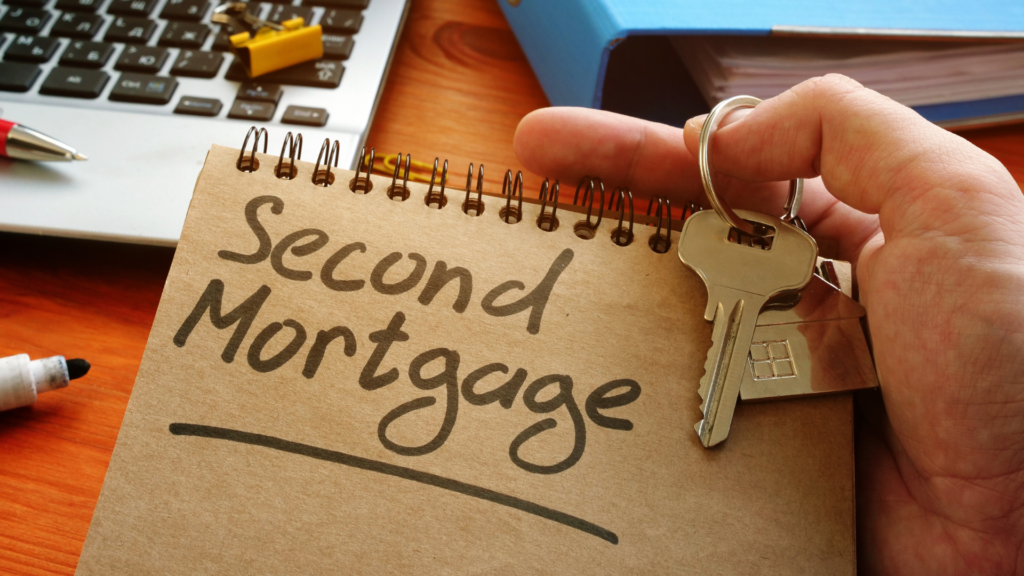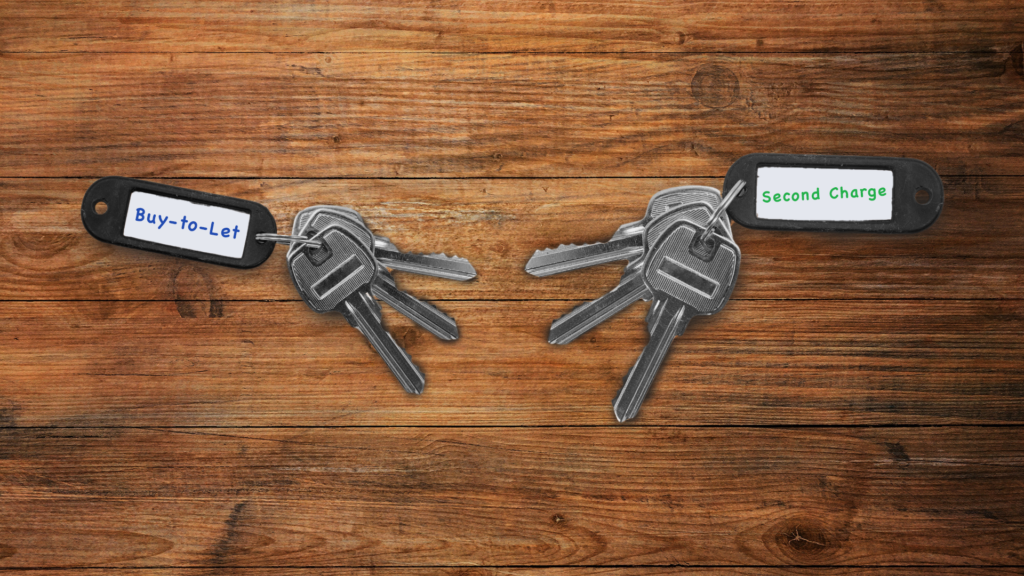- How Much Can You Borrow with a Second Charge Mortgage?
- What Determines Your Second Charge Mortgage Amount?
- How To Get the Best Out of Our Second Charge Mortgage Calculator?
- How Your Existing Mortgage Influences Second Mortgages
- Lendersâ Criteria for A Second Charge Mortgage
- Digging Deeper: Second Charge Mortgage Explained
- The Bottom Line
Second Charge Mortgage Calculator – Get a Quick Quote

You’re looking to borrow more money using your home, and a second charge mortgage might just be what you need.
In the UK, these mortgages let you borrow from a few thousand pounds up to larger amounts, depending on your home’s value and how much you still owe on your first mortgage.
How much exactly? Well, it depends on your situation.
Our second charge mortgage calculator helps you figure out the amount you could potentially borrow, without any hassle. Just a few clicks and you get an estimate tailored for you.
Keep on reading to learn more about how it all works.
How Much Can You Borrow with a Second Charge Mortgage?
Try our handy second charge mortgage calculator below.
It only takes less than 30 seconds to know how much you can borrow. Simply enter your basic information and get an instant, personalised estimate.
[Embedded Second Charge Mortgage Calculator]
Remember though, while these calculators give you a useful starting point, they don’t cover everything.
For a more exact figure, it’s best to talk to a mortgage broker. They’re the experts who can take a closer look at your situation and give you a clearer picture of what you can borrow.
To get started, simply send an inquiry. We’ll set up a free and no-obligation chat with the right second charge mortgage broker who can give you the full picture of your loan options.
What Determines Your Second Charge Mortgage Amount?
When you’re thinking about a second charge mortgage, how much you can borrow mainly depends on a couple of big things: your money situation and what you earn.
Lenders look closely at your finances to make sure you can handle paying both your original mortgage and the new one.
Here’s a key part: lenders often use a rule based on your income to decide how much they’ll lend you. It’s usually around 4.5 times your yearly income.
Sometimes, if your financial health is really good, they might go up to 5 or even 6 times your income.
But the most important thing they check is whether you can comfortably manage the payments for both mortgages.
How To Get the Best Out of Our Second Charge Mortgage Calculator?
Our Second Charge Mortgage Calculator is not only simple to use, but it’s also really user-friendly. You don’t have to worry about sharing too much personal info to get started.
You can play around with the numbers as much as you like. This helps you find the right loan amount and repayment period for your situation.
If the calculator shows that you can’t get a loan based on what you’ve entered, it’ll point out what might be the problem. This lets you tweak your details and look at other options.
A few things to keep in mind:
- Accuracy Matters – The more accurate your information, the more reliable your estimate will be.
- Each Case is Different – Our calculator gives you a general idea, but each lender has their own specific rules. If you need more detailed advice, talking to a good mortgage advisor is a great idea.
- Just a Starting Point – Remember, the figures from the calculator are estimates. For exact numbers and tailored options, it’s best to consult a second charge mortgage advisor.
How Your Existing Mortgage Influences Second Mortgages
When you’re looking at getting a second mortgage, your current mortgage plays a big part in the decision.
Lenders will take a good look at how much you’re already paying for your first mortgage. This is to make sure you can handle the extra payments.
If your current mortgage payments are quite high, it might affect how much more lenders think you can borrow. They want to be sure that adding a second mortgage won’t be too much for you to manage financially.
Lenders’ Criteria for A Second Charge Mortgage
Not all lenders think the same way when it comes to second mortgages. They have different rules and requirements.
For example, some might have a minimum income level you need to meet before they’ll lend you money. Others might look at how much your second property is worth compared to your first one.
Each lender has their way of deciding if they’ll give you a second mortgage and how much they’re willing to lend. That’s why it’s important to look around and find a lender whose criteria match your situation.
Digging Deeper: Second Charge Mortgage Explained
What is a Second Charge Mortgage?
A second charge mortgage is an additional loan you take out against your home, which already has a mortgage on it. It’s like taking a second loan using your home as security.
Here’s how it works:
- You’ve got a mortgage on your house already. This is your first loan.
- Then, you decide to borrow more money. This new loan is the second charge. Your house is still the security for this loan, just like with the first one.
The main thing to remember is that if you have trouble paying back, your original mortgage gets priority over the second one. But if you can’t pay both, there’s a risk you could lose your home.
So, taking out a second charge mortgage means you’re borrowing more money. It’s a way to get extra funds, but it’s crucial to think about the risks involved.
Who Should Consider a Second Charge Mortgage?
A second charge mortgage could be right for you in these situations:
- If you face high fees for paying off your first mortgage early, a second charge mortgage can be a cheaper option.
- If getting a personal loan is tough for you, maybe because you’re self-employed or your financial situation is complex.
- If your credit score isn’t as good as it was or your finances have changed since your first mortgage, remortgaging might not offer good rates. A second charge mortgage might be easier to get, even though it might have higher interest rates.
- If you want to put all your debts like credit card bills and loans into one place, a second charge mortgage can do that. Just be aware that this means your home could be at risk if you can’t keep up with the payments.
Can a Mortgage Broker Simplify My Second Home Purchase?
A mortgage broker can greatly simplify the process of getting a second mortgage. They have expert knowledge of the mortgage market and can find options that fit your specific needs.
Brokers have access to a wide range of lenders and their various mortgage products. This means they can find you a deal that matches your financial situation and preferences.
Plus, they explain complex mortgage terms in simple language, making the whole process easier to understand and less stressful for you.
How to Qualify for a Second Charge Mortgage?
To get a second charge mortgage, there are certain things you need to have:
- You must have enough equity in your home. Equity is the value of your home minus what you still owe on your first mortgage.
- A steady income is important so that you can pay back the new loan.
- A good credit score is helpful, but some lenders might still consider you even if your credit history isn’t perfect.
- You should be at least 18 or 21 years old, but some lenders might ask that you be older.
As for the documents you need:
- You’ll need to show payslips or tax returns to prove how much you earn.
- Recent bank statements are needed to show how you handle your money.
- You’ll have to provide identification like a passport or driving licence.
- A recent bill or similar document to prove where you live.
- Details about your current mortgage, including how much you still owe and your payment history.
It’s important to note that each lender has their own rules, so it’s a good idea to check with them or talk to a mortgage advisor to make sure you’ve got everything covered.
Who Are the Second Charge Mortgage Lenders?
In the UK, if you’re thinking about a second charge mortgage, there are quite a few lenders you might come across. Some of these include:
- West One
- Pepper Money
- NatWest
- Halifax and Santander
- Secta Finance
- Freedom Finance
- Revolut
- Leeds Building Society
- Barclays
- Leek United Building Society
- Metro Bank
- Nationwide
Remember, this list doesn’t cover everyone. If you want more information, just let us know. We can put you in touch with a top broker who can show you more options and help you find the best deal.
What are the Second Charge Mortgages Fees?
When you get a second charge mortgage, it’s not just about the amount you borrow. There are a few costs and fees you need to think about:
- Set-up or Arrangement Fees. These differ from one lender to another and can range from £0 to £2,500.
- Legal Fees. You’ll likely pay between £500 and £1,000 for the legal work that’s needed.
- Valuation Fees. These start at about £150 and vary depending on the size and value of your property.
- Broker Fees. If you use a broker, they might charge you about 1-2% of the loan amount.
It’s important to know that second charge mortgages often have higher interest rates than your first mortgage. So, you need to consider the whole cost, including these fees and the interest rate.
To save money, it’s a good idea to compare different lenders. Look at more than just the interest rates; think about all the fees involved.
Sometimes, a loan with a higher interest rate but lower total fees can be the cheaper option in the end. Make sure to read everything carefully so you understand what you’re signing up for.
What Happens If I Move House with a Second Charge Mortgage?
When you’ve got a second charge mortgage and are thinking about moving homes, there’s something really important to keep in mind.
If you sell your house, you have to pay off both your original and the second charge mortgages. This means the money you get from selling your house will first be used to clear these loans.
So, when you’re planning to buy a new house, you might end up with less money than you thought for your next deposit. This is a key thing to think about, especially if you’re hoping to move soon
How Much Deposit Do I Need To Put Down?
The amount of your deposit depends on the Loan-to-Value (LTV) ratio. This is a fancy way of saying how much of the home’s value the lender is willing to cover.
In the UK, lenders usually expect you to have a deposit of about 25%, which means they’d cover up to 75% of the property’s value with the mortgage.
But, it’s not the same for everyone. Your deposit amount can change based on how lenders see your financial situation.
If they think you’re a safe bet, they might ask for a smaller deposit. It all comes down to how much they trust you to pay back the loan.
How Do I Estimate My Second Mortgage Repayments?
To estimate your second mortgage repayments, consider the type of mortgage, the length of the term, and the interest rate.
You can use a mortgage repayment calculator to get an idea of your monthly payments. This tool allows you to input different scenarios and see how they affect your potential repayments.
It’s a handy way to start planning your budget and understanding what you might need to pay back each month.
[Embedded Repayment Mortgage Calculator]
Can I Release Equity to Buy a Second Home?
Releasing equity from your first home can be a viable option for financing a second property purchase.
Equity release involves accessing the value that you’ve built up in your home. Lenders will consider the intended use of your second property and whether you can afford both mortgage repayments.
This option can work well if you have sufficient equity in your first home and can comfortably manage the additional financial commitment.
What are the Alternatives to Second Charge Mortgages?
Sometimes a second charge mortgage might not be the best fit for you. If that’s the case, don’t worry – there are other choices you can look at. Here are a few alternatives:
- Remortgaging. This means changing your current mortgage to a new one. You might find a better interest rate or even borrow some extra money this way.
- Personal Loans. These are loans that aren’t linked to your house. They’re a bit like using a credit card, but you can usually borrow more. Keep in mind, though, that the interest rates might be higher than what you’d get with a mortgage.
- Saving Up. This is the safest way because it doesn’t involve borrowing. It means putting money aside over time until you have enough for what you need. It takes patience and a good plan, but there’s no risk of debt.
Each of these options has its pros and cons, so it’s all about finding what works best for you and your financial situation.
The Bottom Line
When it comes to understanding your borrowing options with a second charge mortgage, using a calculator can be a real game-changer.
It gives you a clear and quick estimate of how much you might be able to borrow, based on your current financial situation. This tool is super helpful in giving you a starting point and helping you plan.
But remember, while a calculator is great for getting an initial idea, there’s more to the picture.
This is where a second charge mortgage advisor can make a big difference. They’re experts in the field and can guide you through the finer details of the mortgage process.
They can help you understand the best options for your circumstances and work out the most cost-effective way to borrow. Plus, they can answer any questions you might have along the way.
If you’re looking for a quicker and stress-free way to find the right mortgage advisor, we’re here to help. Just get in touch, and we’ll connect you with an FCA-qualified broker who specialises in second charge mortgages.
Get Matched With Your Dream Mortgage Advisor...

Frequently asked questions
Do I need to tell my current mortgage provider about the second charge mortgage?
Yes, you need to let your current mortgage lender know if you’re planning to take out a second charge mortgage. It’s important because this new loan will also be secured against your home, the same property that’s already securing your first mortgage.
Your existing lender needs to agree to this since the second charge mortgage could affect their security.
Can I get a second charge mortgage for a Buy-to-Let investment?
Yes, you can get a second charge mortgage for a buy-to-let investment. This type of mortgage allows you to borrow money using the equity in your home, which you can then use for your buy-to-let investment.
It’s a popular choice for landlords looking to expand their property portfolio. Just like any other mortgage, you’ll need to meet certain criteria set by the lender, such as having enough equity in your property and a stable income to cover the repayments. It’s a great option if you’re looking to invest in property but don’t have the necessary funds readily available.




